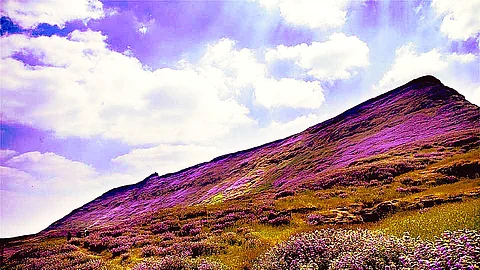

Pune: Lonavala, often called the ‘Mini Switzerland’ of Maval, is captivating tourists with its blooming Karvi flowers (Strobilanthes callosa) that blanket the region’s scenic meadows. The Karvi blooms every seven years, making this a special occasion.
The rolling hills, vibrant purple flowers, flowing streams, and a mix of sun, rain, and mist create a magical experience that draws thousands of nature enthusiasts to the area daily.
The Maval region is a haven of biodiversity, known for its forts, ancient temples, caves, and dams that attract millions of tourists each year.
This season, the ‘Mini Kaas Plateau’ near Lonavala has emerged as a standout attraction, thanks to the flourishing wildflowers, particularly Karvi, Sonki, Terda, Kurdu, Seeta’s Tears, and various orchids.
These blossoms are significantly enhancing the natural beauty of Lonavala, especially around the meadows near Tiger Point.
Unlike other blooms that cover steep mountain slopes, the Karvi flowers here spread across the open meadows, offering a unique view. Visitors flock to these vibrant purple flowers, which are a rare sight as they bloom once every seven years.
The blooming Karvi in Lonavala has been compared to the famous Kaas Plateau of Satara, known for its colorful display of flowers.
Tourists often capture the blooms in short videos and reels, posting them on various platforms where they quickly go viral. There have been reports of visitors riding bikes through the flower fields and carelessly stepping on Karvi plants.
Environmentalists emphasize the importance of protecting Karvi due to its crucial role in the ecosystem.
"Karvi provides essential support for various insects like butterflies and bees, aiding pollination, while its foliage serves as food for herbivores," says Sagar Kulkarni, a renowned flower researcher from Satara.
Shivaji Gade, a nature enthusiast, says, "The lack of awareness among tourists about the ecological significance of these flowers is alarming. Some visitors are seen plucking flowers and bending plants for photographs, unknowingly harming the natural cycle."
